外研版选修七Module 3 Literature-Grammar(14张)
文档属性
| 名称 | 外研版选修七Module 3 Literature-Grammar(14张) |

|
|
| 格式 | zip | ||
| 文件大小 | 74.7KB | ||
| 资源类型 | 教案 | ||
| 版本资源 | 外研版 | ||
| 科目 | 英语 | ||
| 更新时间 | 2019-07-19 00:00:00 | ||
图片预览

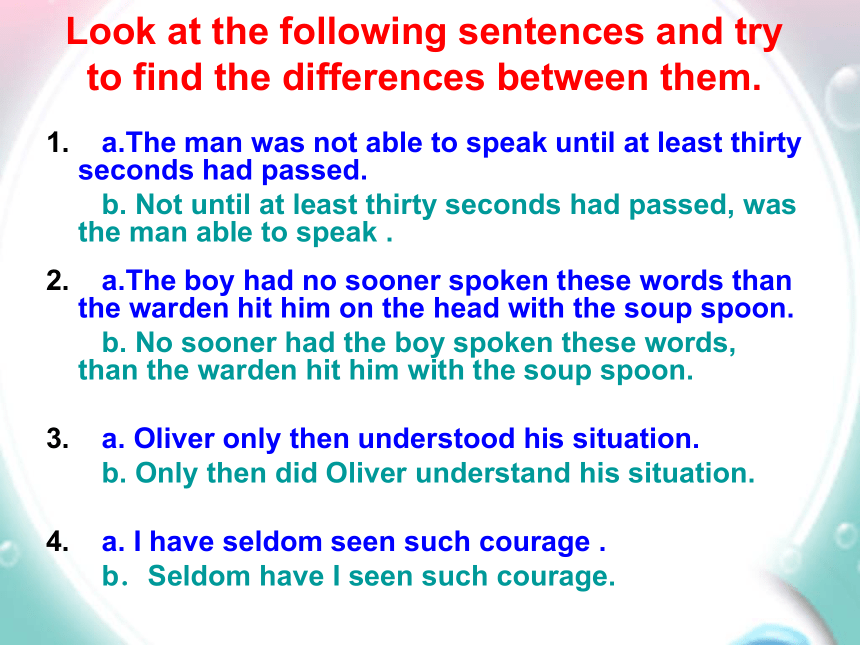
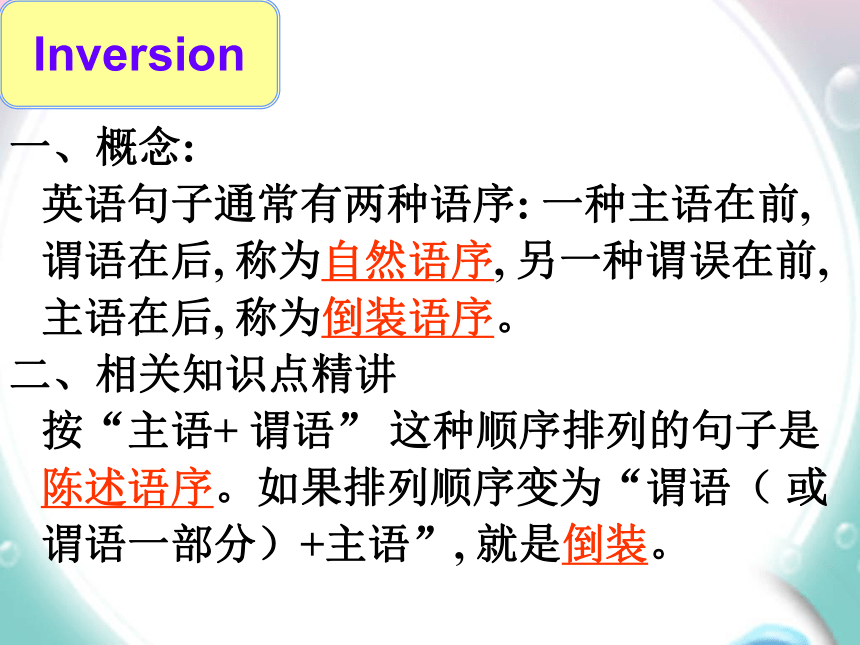
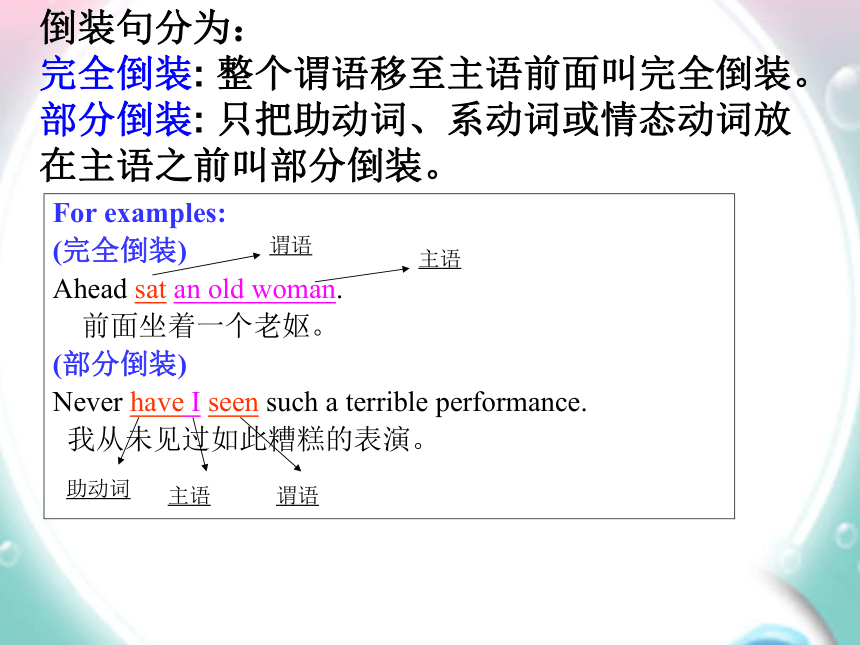
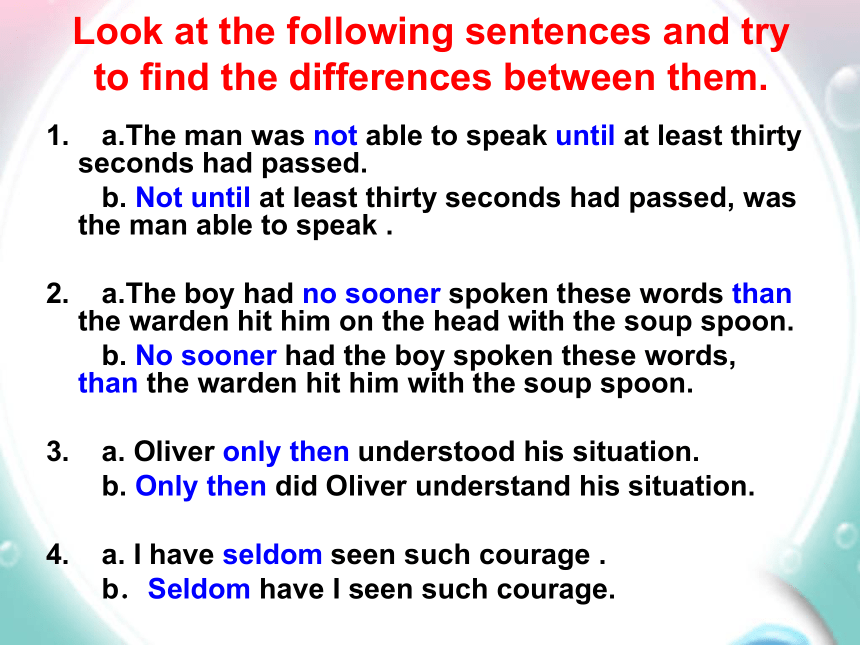
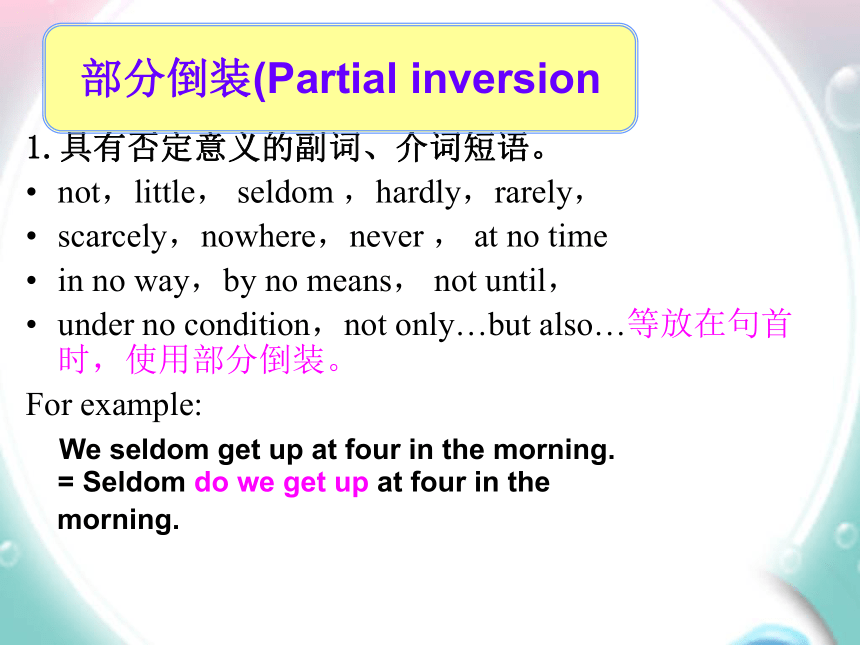
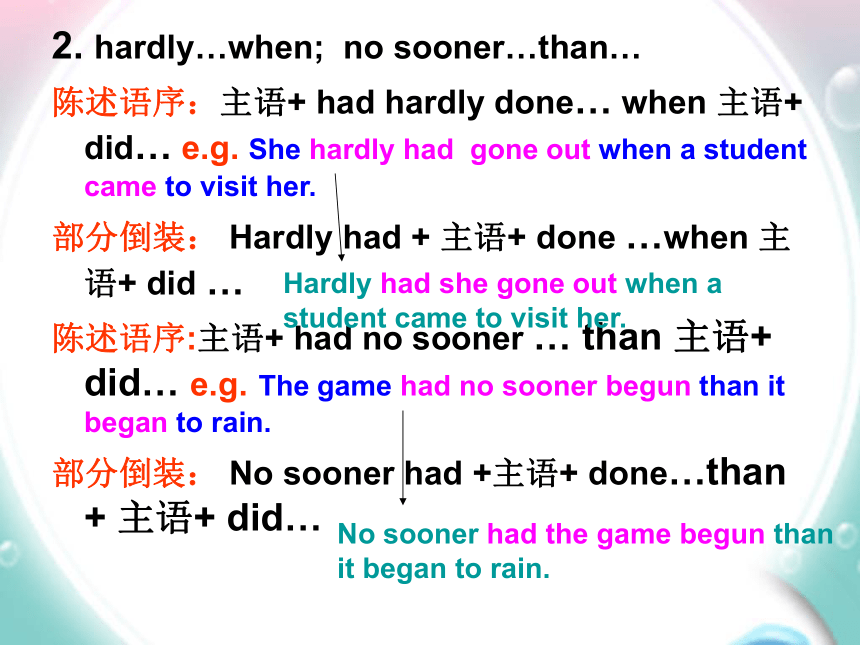
文档简介
课件14张PPT。Grammar
外研版
高二年级(选修7)
Module 3
Look at the following sentences and try to find the differences between them.1. a.The man was not able to speak until at least thirty seconds had passed.
b. Not until at least thirty seconds had passed, was the man able to speak .
2. a.The boy had no sooner spoken these words than the warden hit him on the head with the soup spoon.
b. No sooner had the boy spoken these words, than the warden hit him with the soup spoon.
3. a. Oliver only then understood his situation.
b. Only then did Oliver understand his situation.
4. a. I have seldom seen such courage .
b.Seldom have I seen such courage.
一、概念: 英语句子通常有两种语序: 一种主语在前,谓语在后, 称为自然语序, 另一种谓误在前,主语在后, 称为倒装语序。
二、相关知识点精讲 按“主语+ 谓语” 这种顺序排列的句子是陈述语序。如果排列顺序变为“谓语( 或谓语一部分)+主语”, 就是倒装。Inversion倒装句分为: 完全倒装: 整个谓语移至主语前面叫完全倒装。 部分倒装: 只把助动词、系动词或情态动词放在主语之前叫部分倒装。For examples:
(完全倒装)
Ahead sat an old woman.
前面坐着一个老妪。
(部分倒装)
Never have I seen such a terrible performance.
我从未见过如此糟糕的表演。谓语主语助动词主语谓语Look at the following sentences and try to find the differences between them.1. a.The man was not able to speak until at least thirty seconds had passed.
b. Not until at least thirty seconds had passed, was the man able to speak .
2. a.The boy had no sooner spoken these words than the warden hit him on the head with the soup spoon.
b. No sooner had the boy spoken these words, than the warden hit him with the soup spoon.
3. a. Oliver only then understood his situation.
b. Only then did Oliver understand his situation.
4. a. I have seldom seen such courage .
b.Seldom have I seen such courage.
1.具有否定意义的副词、介词短语。
not,little, seldom ,hardly,rarely,
scarcely,nowhere,never , at no time
in no way,by no means, not until,
under no condition,not only…but also…等放在句首时,使用部分倒装。
For example:
We seldom get up at four in the morning. = Seldom do we get up at four in the
morning.
部分倒装(Partial inversion2. hardly…when; no sooner…than…
陈述语序:主语+ had hardly done… when 主语+ did… e.g. She hardly had gone out when a student came to visit her.
部分倒装: Hardly had + 主语+ done …when 主语+ did …
陈述语序:主语+ had no sooner … than 主语+ did… e.g. The game had no sooner begun than it began to rain.
部分倒装: No sooner had +主语+ done…than + 主语+ did…Hardly had she gone out when a student came to visit her.No sooner had the game begun than it began to rain.3. only 及所修饰的副词、介词短语或状语从句放在句首时,要用: only + 状语从句+ be /助动词/情态动词+主语+谓语
副词
介词短语
e.g. Only when he told me the news did I know what had happened.
Only then did he understand his situation.
Only in this way can you make progress in your English.
4.当not until…放在句首引出主从复合句时,主句倒装,从句不倒装。
e.g. The mother did not leave the room until the child fell asleep.
Not until the child fell asleep did the mother leave the room.
1. Hardly had the
boy begun eating
2.Not until they had
talked for hours
3.No sooner had the
warden left
4.Only after Oliver was
locked in the room a. did the managers
decide what to do
b. did he start crying
C. than the boys started whispering to each other.
d. when the warden took his bowl away from him
Match the two parts of the sentences.1. It was the first time that a story had been so popular.
→ Never _______________________________________.
2.The boys had just started to sing when the teacher told them to stop .
→ Hardly ________________________________________.
3.He was only able to speak after nearly one minute’s silence.
→ Only after ________________________________________.
4.I didn’t notice it until it was yesterday.
→ Not until ________________________________________.Rewrite the sentences.before had a story been popularhad the boys started to sing when the teacher told them to stop.one minute’s silence was he able to speak.it was yesterday I noticed it .高考链接1.(课标全国)Only when he reached the tea house ___ it was the same place he'd been in last year.
A. he realized B. he did realize
C. realized he D. did he realize
2. (福建)—It's nice. Never before ____ such a special drink!
—I'm glad you like it.
A.I have had B.I had
C.have I had D.had I
3.(湖南)Only after they had discussed the matter for several hours __ a decision.
A.they reached B.did they reach
C.they reach D.do they reach
4.(四川)Not until I came home last night ___
to bed .
A. Mum did go B. did Mum go
C. went Mum D. Mum went
5.(安徽) Never in my widest dreams ____ these people are living in such poor conditions.
A. I could imagine B. could I imagine
C. I couldn’t imagine D. couldn’t I imagine
6.(山东) No sooner ___ to the station ___ the train left.
A. had I got , when B. I had got, than
C. had I got , than D. did I get, whenBye-Bye
高二年级(选修7)
Module 3
Look at the following sentences and try to find the differences between them.1. a.The man was not able to speak until at least thirty seconds had passed.
b. Not until at least thirty seconds had passed, was the man able to speak .
2. a.The boy had no sooner spoken these words than the warden hit him on the head with the soup spoon.
b. No sooner had the boy spoken these words, than the warden hit him with the soup spoon.
3. a. Oliver only then understood his situation.
b. Only then did Oliver understand his situation.
4. a. I have seldom seen such courage .
b.Seldom have I seen such courage.
一、概念: 英语句子通常有两种语序: 一种主语在前,谓语在后, 称为自然语序, 另一种谓误在前,主语在后, 称为倒装语序。
二、相关知识点精讲 按“主语+ 谓语” 这种顺序排列的句子是陈述语序。如果排列顺序变为“谓语( 或谓语一部分)+主语”, 就是倒装。Inversion倒装句分为: 完全倒装: 整个谓语移至主语前面叫完全倒装。 部分倒装: 只把助动词、系动词或情态动词放在主语之前叫部分倒装。For examples:
(完全倒装)
Ahead sat an old woman.
前面坐着一个老妪。
(部分倒装)
Never have I seen such a terrible performance.
我从未见过如此糟糕的表演。谓语主语助动词主语谓语Look at the following sentences and try to find the differences between them.1. a.The man was not able to speak until at least thirty seconds had passed.
b. Not until at least thirty seconds had passed, was the man able to speak .
2. a.The boy had no sooner spoken these words than the warden hit him on the head with the soup spoon.
b. No sooner had the boy spoken these words, than the warden hit him with the soup spoon.
3. a. Oliver only then understood his situation.
b. Only then did Oliver understand his situation.
4. a. I have seldom seen such courage .
b.Seldom have I seen such courage.
1.具有否定意义的副词、介词短语。
not,little, seldom ,hardly,rarely,
scarcely,nowhere,never , at no time
in no way,by no means, not until,
under no condition,not only…but also…等放在句首时,使用部分倒装。
For example:
We seldom get up at four in the morning. = Seldom do we get up at four in the
morning.
部分倒装(Partial inversion2. hardly…when; no sooner…than…
陈述语序:主语+ had hardly done… when 主语+ did… e.g. She hardly had gone out when a student came to visit her.
部分倒装: Hardly had + 主语+ done …when 主语+ did …
陈述语序:主语+ had no sooner … than 主语+ did… e.g. The game had no sooner begun than it began to rain.
部分倒装: No sooner had +主语+ done…than + 主语+ did…Hardly had she gone out when a student came to visit her.No sooner had the game begun than it began to rain.3. only 及所修饰的副词、介词短语或状语从句放在句首时,要用: only + 状语从句+ be /助动词/情态动词+主语+谓语
副词
介词短语
e.g. Only when he told me the news did I know what had happened.
Only then did he understand his situation.
Only in this way can you make progress in your English.
4.当not until…放在句首引出主从复合句时,主句倒装,从句不倒装。
e.g. The mother did not leave the room until the child fell asleep.
Not until the child fell asleep did the mother leave the room.
1. Hardly had the
boy begun eating
2.Not until they had
talked for hours
3.No sooner had the
warden left
4.Only after Oliver was
locked in the room a. did the managers
decide what to do
b. did he start crying
C. than the boys started whispering to each other.
d. when the warden took his bowl away from him
Match the two parts of the sentences.1. It was the first time that a story had been so popular.
→ Never _______________________________________.
2.The boys had just started to sing when the teacher told them to stop .
→ Hardly ________________________________________.
3.He was only able to speak after nearly one minute’s silence.
→ Only after ________________________________________.
4.I didn’t notice it until it was yesterday.
→ Not until ________________________________________.Rewrite the sentences.before had a story been popularhad the boys started to sing when the teacher told them to stop.one minute’s silence was he able to speak.it was yesterday I noticed it .高考链接1.(课标全国)Only when he reached the tea house ___ it was the same place he'd been in last year.
A. he realized B. he did realize
C. realized he D. did he realize
2. (福建)—It's nice. Never before ____ such a special drink!
—I'm glad you like it.
A.I have had B.I had
C.have I had D.had I
3.(湖南)Only after they had discussed the matter for several hours __ a decision.
A.they reached B.did they reach
C.they reach D.do they reach
4.(四川)Not until I came home last night ___
to bed .
A. Mum did go B. did Mum go
C. went Mum D. Mum went
5.(安徽) Never in my widest dreams ____ these people are living in such poor conditions.
A. I could imagine B. could I imagine
C. I couldn’t imagine D. couldn’t I imagine
6.(山东) No sooner ___ to the station ___ the train left.
A. had I got , when B. I had got, than
C. had I got , than D. did I get, whenBye-Bye
